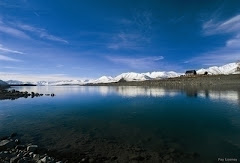Plato is describes the journey to knowledge--explaining how it is that we come to know things, and the reason that most people are unable to achieve true knowledge (instead, they live by belief alone).
Start on the outside of the cave. There is a horse galloping in a field, illumined by the sun. The person who sees this is capable of knowing the truth about the horse. If a person only sees the reflection of a horse in water, the person can know a lot about horses, but the image being viewed is imperfect and wavers. If a person only sees the shadow of the horse, the individual knows about the movements of a horse, but not its color or size. The closer to the cave (taking his journey in reverse), the less the person knows. It is only the person who has seen the horse directly--in the presense of the sun (truth)--that can truly be said to know about horses.
Now let's go back to the beginning. In the cave the people see what the people behind the partition want them to see. They live in a world where they do not see real objects--only imperfect representations of those objects. That is all they know, so they are unaware of the fact that these are imperfect--as far as they concerned, this is reality.
The one who is turned loose and taken to see the fire and the puppets comes closer to the truth, but it is a painful process. First, he has to get used to standing on his legs. He has to allow his eyes adjust to the light. But as these adjustments are made, he is able to understand the charade that he once called reality. Not everyone makes it that far.
Some actually exit the cave, but this is--once again--a painful process. It is painful to the legs as well as the eyes as the person ascends into the presence of the sun. At first, this person can see best at night, because their eyes are still accustomed to darkness.
The rest of the analogy spills out from this. The light of the sun--which governs all life outside the cave (controlling days, seasons, years, etc.)--is truth, which governs all that we do. It is unfortunate that most people are unable to leave the cave. However, those who do have the privilege of learning truth have an obligation to go back and share with those who remain in darkness--to share with them as much truth as they are capable of understanding.
Just remember that those who re-enter the cave also require a period of adjustment, so they appear to know nothing at first. Like philosophers dealing with lawyers and politicians, they are operating in an arena where their knowledge of truth is not understood or accepted, and they will appear foolish.
Thursday, 30 August 2007
Subscribe to:
Comments (Atom)






